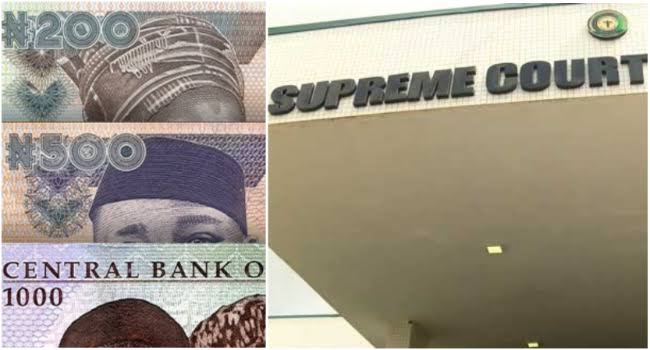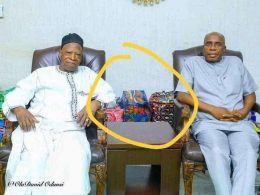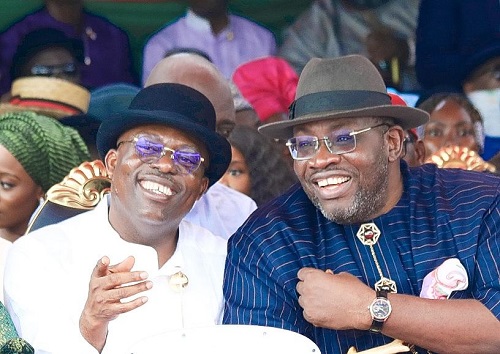There is a sense of uneasiness among Nigerians as they anxiously await the judgment of the Supreme Court in the cases filed by some States to challenge the propriety of the naira swap policy of the Federal Government.
When parties were last in court on February 22, a nine-member panel of the apex court, led by Justice John Okoro, scheduled judgment for March 3 after entertaining final arguments.
The plaintiffs in the cases are Kaduna, Kogi, Zamfara, Katsina, Lagos, Cross River, Ogun, Ekiti, Ondo, Sokoto, Rivers, Kano, Niger, Jigawa, Nasarawa, Plateau and Abia states.
Upon an application by Bayelsa and Edo states, the court, on February 15 joined the two states as co-defendants with the origin sole defendant, the Attorney General of the Federation (AGF).
In his final submission, the lawyer to Kaduna and Kogi states, Abdulhakeem Mustapha (SAN), He urged the court to grant all the reliefs being sought in his clients’ suit and dismiss the notices of objection filed by the AGF and Bayelsa State.
Lawyer to Zamfara State, Abiodun Owonikoko (SAN), who adopted the arguments by Mustapha, said his client also filed an application on February 17 praying the court to set aside the directive issued by President Muhammadu Buhari on February 16 directing that only N200 notes should be in use, in disregard of the pending order of the court.
Owonikoko added that the naira redesign policy of the Federal Government was at variance with the provision of Section 17(2)(c) of the Constitution, which says the governmental actions shall be humane.
He added that the policy has occasioned hardship on the people.
Moyosore Onigbanjo (SAN), the Attorney General of Lagos State, who represented the state, said his state filed several documents in the case.
One of such documents, he said, is a motion seeking an order prohibiting the defendant/respondent (the AGF) from being granted an audience before this court until the defendant or his principal, the President of Nigeria, complies with the order made by this court on the 8th of February, directing that the old notes remain legal tender until the determination of the suit.
Onigbanjo said the suit by Lagos was distinct from the one filed by other states in that it seeks reliefs pertaining to the Lagos State and not the people of the state.
He said the suit was informed by the fact that the naira redesign was affecting the government of Lagos State in the performance of its functions and meeting its responsibilities.
The Lagos AG urged the court to deny the audience to the AGF and grant the prayers sought in the suit.
Samuel Ologunorisa (SAN), who represented Katsina; Shuaibu Abuwa (SAN) for Cross River; Tunde Afe Babalola SAN, for Ogun); O. O. Olowolafe SAN for Ekiti; Charles Titiloye SAN for Ondo and Georgina Udeh for Sokoto State, all urged the court to dismiss the objection raise against the suit by the AGF and Bayelsa State and proceeded to grant all the reliefs sought in the suit by Kaduna, Kogi and Zamfara states.
In their separate cases that were consolidated with the case by Kaduna, Kogi and Zamfara states; Rivers, Kano, Jigawa, Nasarawa, Abia argued that the policy was unconstitutional and should be voided.
Kanu Agabi (SAN), Tijani Gazali (SAN), Kenneth Mozia (SAN) and Audu Anuga (SAN) who represented the AGF, Bayelsa and Edo states urged the court to dismiss the suit for want of jurisdiction and for being incompetent.
Agabi, who also argued that necessary parties were not
before the court, faulted the exclusion of the governor of the CBN as a party in the suit.
He noted that references were made to the CBN 32 times in the plaintiffs’ originating summons and supporting affidavit, while seven reliefs were sought against the apex bank, which was not made a party in the suit.
Agabi, who said his client filed a motion on notice seeking the dismissal of the Form 48 issued on the AGF and the Governor of CBN, added that an affidavit to show cause why Form 48 should be set aside has also been filed.
He argued that President Buhari did not flout the order of the court in his February 16 broadcast, insisting that it was a necessary intervention.









